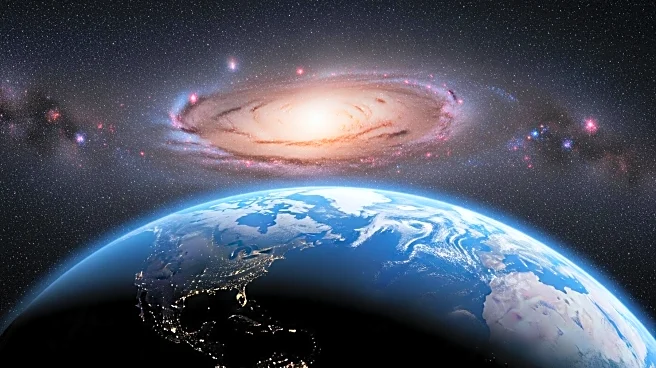What is the story about?
What's Happening?
Recent research has suggested a potential link between Earth's passage through the Milky Way's spiral arms and significant geological events on the planet. Scientists Chris Kirkland and Phil Sutton have utilized data on neutral hydrogen to map the galaxy's density variations over time. By correlating these with zircon isotope records, they have identified a pattern where Earth's crossings through these dense galactic regions coincide with changes in Earth's crustal dynamics. This study highlights the potential influence of cosmic phenomena on Earth's geological history, although establishing a direct causation remains complex.
Why It's Important?
The findings could reshape our understanding of Earth's geological history by introducing cosmic forces as a significant factor. If these galactic crossings indeed influence Earth's crustal dynamics, it could lead to a reevaluation of geological models and theories. This research underscores the interconnectedness of cosmic and terrestrial events, potentially impacting fields such as geology, astronomy, and planetary science. The study also emphasizes the challenges in distinguishing the effects of external cosmic forces from Earth's internal processes, which could drive future research in these areas.
What's Next?
Further research is needed to establish a definitive causal link between Earth's galactic passages and geological changes. Scientists may focus on refining the correlation between zircon isotope variability and galactic arm crossings. This could involve more detailed studies of zircon crystals and their isotopic compositions, as well as advanced modeling of galactic density variations. The findings could prompt new investigations into the broader implications of Earth's position within the galaxy, potentially leading to new insights into the planet's geological history and the forces that have shaped it.
Beyond the Headlines
The study raises questions about the broader implications of cosmic phenomena on Earth's history. It suggests that cosmic events, often considered distant and unrelated, may have played a significant role in shaping the planet's geological and possibly biological evolution. This perspective could lead to a paradigm shift in how scientists view the relationship between Earth and the cosmos, encouraging interdisciplinary research that bridges astronomy and Earth sciences.















